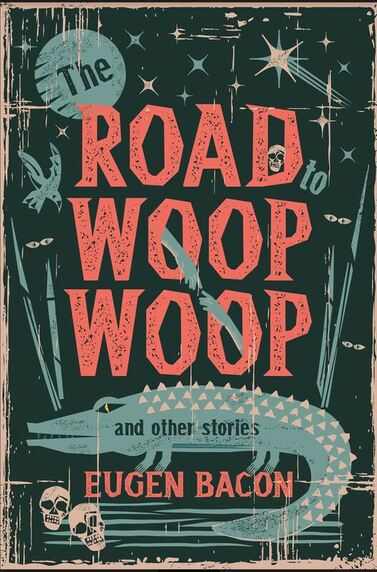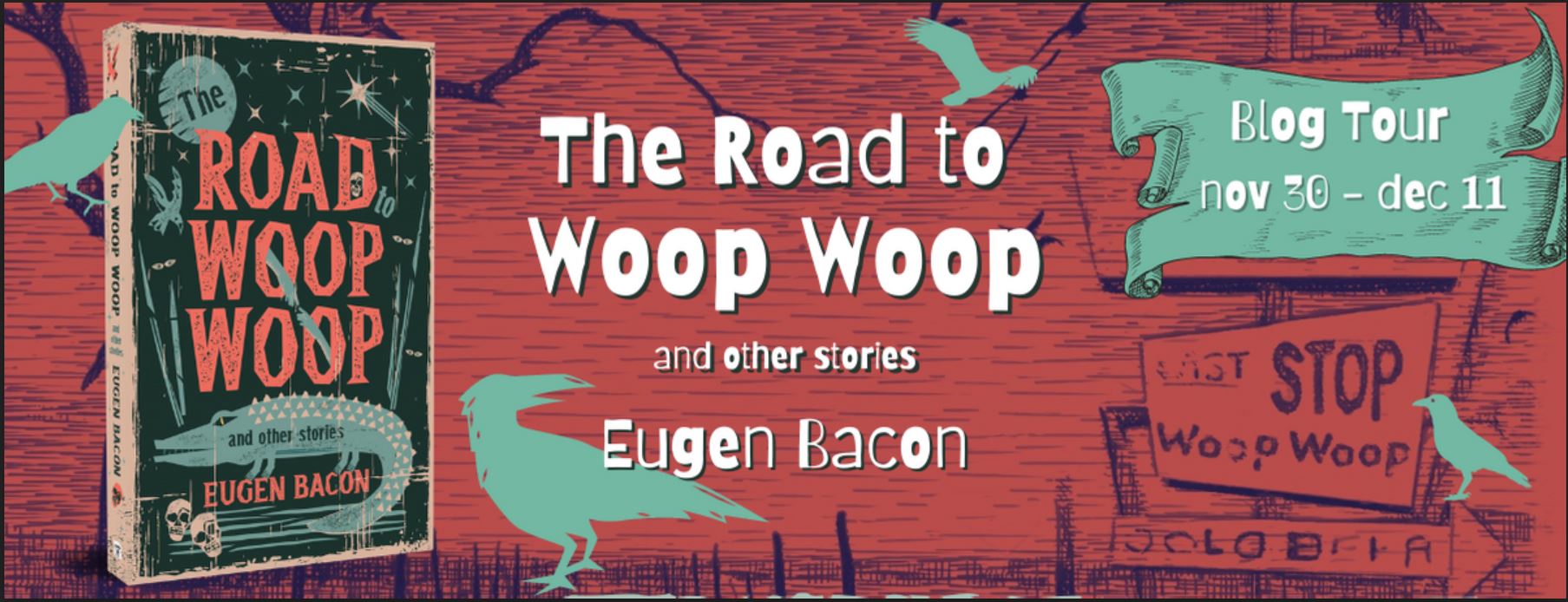
by Eugen Bacon
RELEASE DATE: DEC 1, 2020
GENRE: Collection / Speculative Fiction / Dark Fantasy
BOOK PAGE:
https://www.meerkatpress.com/books/the-road/
SUMMARY:
Eugen Bacon’s work is cheeky with a fierce intelligence, in prose that’s resplendent, delicious, dark and evocative. NPR called her novel Claiming T-Mo ‘a confounding mysterious tour de force’. The Road to Woop Woop and Other Stories imbues the same lushness in a writerly language that is Bacon’s own. This peculiar hybrid of the untraditional, the extraordinary within, without and along the borders of normalcy will hypnotise and absorb the reader with tales that refuse to be labelled. The stories in this collection are dirges that cross genres in astounding ways. Over 20 provocative tales, with seven original to this collection, by an award-winning African Australian author.
BUY LINKS: Meerkat Press | Amazon | Barnes & Noble
Review:
Woop Woop is an Australian phrase for a destination outside your area. The Road to Woop Woop is a collection of short stories by Australian writers that fall somewhere into the speculative fiction category. Each story led me on a journey; some of the journeys were to places very familiar and some were to places unknown. Like any collection of short stories, there were some stories that I liked better than others and characters that I wanted to stay with longer. Most of these stories had me thinking deeply about humanity and the state of the world.
Some of my favorite stories are: A Maji Maji Chronicle, A Case of Seeing, Five-Second Button, Being Marcus and Dying. A Maji Maji Chronicle follows a magician father and son as they travel back in time to a native village in 1905 as they are being invaded by white men. The father gives the village leader a magical gift that alters the timeline. This story had me thinking about the effects of a single moment in history as well as greed and the balance of power. A Case of Seeing is a great science-fiction mystery that had me wanting more as a Detective with a supernatural gift is called to the crime scene for the death of a Nobel Prize candidate. Five-Second Button delves into a fantasy that we have probably all wanted to discover at some point, a chance to see your future. What the character chooses to do with her life knowing her future is really interesting. Being Marcus is a take on Brutus' betrayal of Caesar where Brutus was given a sentence of eternal life. It was really interesting to see this character in the present day and the decisions he made. Dying is a Groundhog's Day-esque humorous take on life, fate and who is ultimately pulling the strings.
This book was received for free in return for an honest review.

Eugen Bacon is African Australian, a computer scientist mentally re-engineered into creative writing. She’s the author of Claiming T-Mo (Meerkat Press) and Writing Speculative Fiction (Macmillan). Her work has won, been shortlisted, longlisted or commended in national and international awards, including the Bridport Prize, Copyright Agency Prize, Australian Shadows Awards, Ditmar Awards and Nommo Award for Speculative Fiction by Africans.
AUTHOR LINKS: Website | Twitter
A GOOD BALL
“The game is alive,” coughed the score worm. It illuminated with body shimmers who was winning. It was the Cyclops.
The amphitheater erupted.
An umpire blew his horn and the third quarter of the ball game started.
The way the game played was by each group of ten players dodging a ball that was a human skull hurled by the opposing team. Wear had nearly leveled the boned shape to a smooth oval. When it struck a victim, they were banished to the sin bin, sometimes for eons, unless a release deal was struck by song, delivered in prose poetry.
The first quarter had seen the Troika lose a trinity of players and one-third. A third because the precocious fullback was only a child.
During the break, the Troika had put a valiant effort to rescue their trinity, if not the one-third. Their lead siren, a third eye for the nose and fur all over her three bodies, understood the value of a trio. She sang in light waves that accelerated in orthodox lines across the one end of the amphitheater to the other and found refraction in the audience. Resonance jumped between bodies, patterns and frequency emitting a synchronous melody:
Earth stories oblivious to time and space are not our element. Like the boy with cowlick hair and a briefcase on his lap: he is a terrorist. A suicide vest caresses his chest. He smiles. His eyes are a palimpsest swollen with poems about phantom virgins floating in songline. They flow in monochrome, infographics that cascade into the working sea of his creed. No contrition or penance, just a magnificent white bird, yellow-beaked. It supplicates on bended knee but its droppings are full of calligraphy. Text ricochets from bird poop, hopping and skipping in telescopic trails of full stops, semicolons and em dashes. No adjectives as the bomb erupts.
At the end of the tune, the score worm coughed and announced the verdict: “Your song was not quick to transition between notes. It was lacking in the depiction of humankind’s diversity.”








 RSS Feed
RSS Feed



